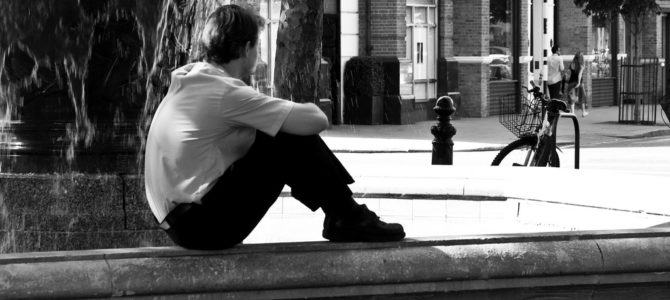
We were supposed to be happy. Americans live in a time of comparative peace and unprecedented prosperity, with technological wonders and remarkable personal liberty.
For most of us, the old indignities of life are gone or greatly reduced. We have light and water—hot or cold—on command, our bodily waste is flushed away, and we live with central heating and cooling. Indeed, for many of us, sweating, stinking, and suffering are what we do for exercise or recreation, not inescapable features of life. Endless entertainment and nearly boundless education are available for the price of a smartphone and an internet connection, or just a library card.
Yet the symptoms of civilizational despair are persistent and worsening. The doleful litany is familiar: Fertility and life expectancy are down; suicides are up; overdose deaths are way up. The press recently informed us that deaths from alcohol abuse are up. The comforts of modern life have not made us happy, even as material comforts that were once exclusive to the rich have become the norm. Never before in human history have so many, with so much, been so miserable.
Nor has sexual liberation, the last, best hope for materialist pleasure, brought general happiness. In a prescient essay, Malcolm Muggeridge wrote, “Sex is the only mysticism materialism offers, and so to sex the pursuers of happiness address themselves with an avidity and dedication seldom, if ever, surpassed.”
Sexual pleasure seems to offer a glimmer of transcendence, so we try to cheat the reaper with each petite mort. But widespread sexual indulgence has left our culture so far from sexual bliss that even The New York Times is running columns lamenting our sexual dystopia.
With Greater Desires Come Greater Corruption
We are prosperous but anxious, indulged yet unsatisfied. This discontent has increased the allure of socialist schemes for radical change, but these political projects do not address the real reasons for unhappiness.
Government programs and nationalized corporations will not fix American anxiety and depression, or loneliness and heartbreak. As prophets, philosophers, and preachers throughout the ages have reminded us, happiness does not consist of the satisfaction of our material desires, for they will never be satisfied. Desire expands to fill the imagination’s capacity.
Among these thinkers, Jean-Jacques Rousseau, miserable, perverted genius that he was, especially understood the causes of our present discontent. He appeared on the intellectual scene of the French Age of Reason like a portent of doom, declaring that “the arts, literature, and the sciences…fling garlands of flowers over the chains which weigh” mankind down. They “stifle in men’s breasts that sense of original liberty” and “cause them to love their own slavery.” By increasing our desires, they increase our dependence and corruption.
Rousseau imagined mankind’s fall from a happy natural state to our present unhappy social one. As man became social and civilized, he suffered from a “multiplicity of new wants” and became dependent and hierarchical. In contrast to the inflamed desires of civilized man, natural man was little more than an animal, but he also wanted little, and therefore was content, for “his desires never go beyond his physical wants.”
Rousseau idealized those “savages” whom he thought to have remained closest to this natural state and asked, “What yoke, indeed, can be imposed on men who stand in need of nothing?” To desire nothing more than physical necessities is independence.
A Penetrating Psychology of Unhappiness
Although Rousseau’s history and anthropology were often wrong, he nonetheless presented a penetrating psychology of unhappiness, which offers no easy remedy. As he would have predicted, our unprecedented wealth has highlighted the limits of the happiness material possessions and pleasures can provide.
This general prosperity does not abolish, and often exacerbates, the social comparisons and jealousies that persistently plague mankind. We have become dependent on others, both for their services to us and, even more importantly, their opinions about us. Even more than our desires for an abundance of possessions, our interpersonal needs make us dependent.
As social creatures, our psychological well-being is rooted in our relationships. Consequently, Rousseau asserted that “social man lives constantly outside himself, and only knows how to live in the opinion of others, so that he seems to receive the consciousness of his own existence merely from the judgment of others concerning him.” Our culture’s social media obsessions are perhaps the purest illustration yet of this human tendency.
Our need for community and companionship makes us vulnerable to others, and introduces new evils. Society means comparison, and thus jealousy, envy, vanity, and so on. Thus Rousseau saw even love, as much as property, as the ruin of natural man, for “With love arose jealousy.” However delightful love in its various forms may be, its intensity and particularity make it perilous.
The Poles of Isolation and Heartbreak
How, then, may we find happiness in our existence as social beings, possessed of imaginations that inflame our material and social desires? Rousseau knew there could be no return to the state of nature, even if it had existed as he described. He explored diverse options that might mitigate our psychological distress and vulnerability, ranging from quasi-authoritarian politics to private retreat into solitude, and found nothing better than the delights of his idyllic imagination.
Of course, there was an omission in his approach: happiness eluded him because he was afraid of love. It was not only the sins of social envy and comparison that Rousseau shrank from, but love itself. As Rousseau knew, our deepest longing is to love and be loved. We cannot be happy without love.
But we are often afraid of love because it makes us dependent on others. As C. S. Lewis reminded us, to love is to be vulnerable. Loving others and desiring their love in return makes our happiness subject to another’s will. Consequently, happiness requires the risk of unhappiness. The alternative to loneliness is the risk of heartbreak.
Rousseau tried with all of his genius to find a way out of this dilemma—to have love without the risk—but he succeeded only in his imagination. In real life, he became isolated, ignoring others, objectifying them and, in the case of his long-suffering mistress, Therese, effectively subsuming her under his own dominant personality.
Love Hurts, So Screw Love
Like Rousseau, many today respond to the risks and pains of love, family, and community by retreating from them, or seeking some safe substitute. People reduce the risk of heartache by preserving their autonomy and objectifying others, which further inhibits learning how to cope with the inevitable pains of social life and love. Although objectifying people may protect one from a broken heart, it also precludes happiness, for dehumanizing persons precludes the interpersonal relations that make us happy.
Retreating from marriage, family, church, and civic associations may protect from the pains they can inflict, but we still crave companionship and community. Consequently, our culture endlessly invokes ersatz forms of community. For example, brands welcome customers to their “family” and sports teams talk of their fans as a “nation.” Athletes describe their teams as family, and actors talk about the cast and crew of their latest project the same way. These clichéd terms are easily mocked, but they witness to a longing in our souls.
Consequently, the decline of families and communities drives much of our politics. Not only does the government have to step in as families and communities fragment, but many look to political schemes to provide meaning and emotional fulfillment, to end conflict and eliminate sources of anxiety.
The loss of community often exacerbates their anxieties. For example, financial instability is more terrifying for those who cannot rely on help from family, friends, churches, and neighbors if they hit a rough patch. Although government programs can be a fiscal backstop in such instances, they cannot provide for the emotional and relational needs of those they assist. As Rousseau himself seems to have concluded, such political efforts cannot resolve turmoil in our souls and psyches.
An Opportunity Within Despair
This sort of despair provides an opportunity for conservatives and other counter-cultural thinkers. Questions that had been thought closed are being reopened (a scathing critique of liberalism, broadly understood, has been the hot political book of the last year), and we may find a receptive audience for our views on the enduring verities of human nature.
This is the allure that took Jordan Peterson from academic obscurity into a cultural phenomenon. Our goal is not to provide a political formula for happiness, for politics can do more to harm than to help. Rather, there are genuine personal, cultural, and spiritual solutions to consider and discuss.
Conservatives know that complete happiness is not found in this life, while much can be done to alleviate our miseries. We can have gratitude for our material blessings and relief from physical ills, without seeking our happiness in wealth. We can cultivate those virtues (such as humility, charity, patience, and self-control) that mitigate social conflict, and discourage vices (such as envy, pride, jealousy, and lust) that inflame them.
We can also provide an account of human flourishing that explains why happiness and heartbreak are linked. It is not only that those we love can hurt us, but that even the best relationships are subject to our mortality. As traditional wedding vows put it, “‘Til death do us part.”
Happiness Requires Embracing Suffering
Happiness requires accepting our mortality, but our culture sanitizes and cordons-off death and neglects the philosophical and religious reflection that reconciles us to death and prepares us for it. What our culture needs—recognition of the realities of human nature, the instilling of self-control, living with love and charity in community, and offering hope for the hereafter—is what churches should be preaching and, more importantly, exemplifying.
Unfortunately, we frequently fail in these things (I very much include myself in this indictment), and we will have little to offer an unhappy culture if we are anxious, defensive, and hateful toward our political and cultural opponents. If we do not want those we disagree with to be happy; if we do not model a life of joy for them, why should they bother to listen to us?
All we need is love? Well, yes, but that is the most difficult thing in the world to live out. It is easy to love mankind in the abstract, but real people are difficult to love. Loving your neighbor is theoretically attractive but practically difficult. Did Jesus mean to include neighbors who wake people up at 3 a.m. the night before the bar exam, or who introduce bedbugs into the building, or who leave rotting trash out for a week?
Natural chemical rushes, such as those that accompany new romantic love or the birth of a child, may help with loving some people for a time, but they will also lead us astray if we mistake the emotional high for the substance of love. First Corinthians 13 is a popular reading at weddings, but its description of love is not flowers, butterflies, and happy chemicals. It is almost brutal in its self-abnegation: love is patient and kind; it is not envious, boastful, arrogant, rude, insistent on its own way, irritable or resentful. It bears and endures all things.
This self-overcoming is more divine than the “divine madness” the Greeks saw in eros. Such a triumph of love over the corrosive, socially rooted self-regard that Rousseau called amour-propre is the key to happiness, but it may seem impossible by human means alone. Perhaps, to appropriate a phrase from another philosopher, only a god can save us.









